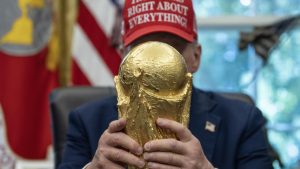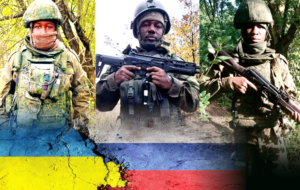Trump Brings 2026 World Cup Spotlight to Washington: in fusion with Politics, Power and Promises
The World Cup has always been more than a sporting event. It is theatre, diplomacy, commerce, and culture wrapped around 90 minutes of football. When President Donald Trump announced that the official draw for the 2026 FIFA World Cup would take place on December 5 at Washington’s John F. Kennedy Center for the Performing Arts, the choice of venue and the spectacle itself carried significance far beyond the game.
![]()
Flanked in the Oval Office by FIFA President Gianni Infantino and Vice President J.D. Vance, Trump framed the tournament as probably the biggest event in sports, echoing Infantino’s description of the expanded 48-team edition as the equivalent of 104 Super Bowls. The hyperbole underscores the scale of 104 matches across 16 host cities in the United States, Canada, and Mexico. This is the largest and most logistically ambitious World Cup in history.
The decision to host the draw in Washington, D.C., a city not marked as match venues, reflects the soft power dimension of the World Cup. While games will be played in stadiums from Mexico City’s Estadio Azteca to New Jersey’s MetLife Stadium, the U.S. capital provides a symbolic stage for diplomacy. The Kennedy Center, a cultural landmark named after a president whose legacy is tied to internationalism, will serve as a backdrop for a rare intersection of sports, politics and statecraft.
Hence, football that is long considered as a global unifier, will now double as a diplomatic instrument. Because to the United States that will be co-hosting the tournament with Canada and Mexico, it will not only be about sharing logistics but reaffirming North American cooperation at a time of political frictions over trade, migration and security; since Trump has recently been in a clash with Mexico, Canada, etc., due to his global trade policy.
![]()
So, the World Cup draw presents an opportunity to showcase collaboration on a stage where billions will be watching.
President Trump used the announcement to reassure the public about security measures, noting National Guard deployments and federal law enforcement support for the high-profile ceremony. In an era where global sports events have become both targets and platforms for protest, the emphasis on safety was as much political as practical.
Hosting the draw in Washington allows the U.S. government to project control, stability and hospitality in equal measure. It also highlights the balancing act required of modern mega-events, creating an atmosphere of celebration while navigating the realities of global security threats.
Beyond diplomacy and politics, the 2026 World Cup is expected to bring tangible social impacts. The tournament will stretch across three nations with vastly different football cultures: Mexico, where the game is religiously accepted; Canada, where football is growing in the shadow of ice hockey; and the U.S., where soccer continues its steady rise in popularity. The Kennedy Center draw will symbolically connect these audiences, setting the stage for a shared North American moment.

For local communities, the tournament promises billions in tourism, infrastructure and jobs. Yet the politics of inclusion are equally important. With 48 teams, smaller nations from Africa, Asia, and the Caribbean will have a greater chance of qualifying, giving their citizens a rare spotlight on the world’s biggest sporting stage. The draw in Washington will determine those dream matchups, where global powerhouses like Brazil and Germany may share the same group with underdog nations carrying the pride of millions back home.
When asked if he might personally participate in conducting the draw, Trump quipped that it would be very interesting, but deferred to Infantino as the boss, to direct. The remark underscored the unusual blend of politics and sport: a U.S. president weighing whether to stand on stage with FIFA officials to pull names from pots.
For Infantino, the partnership with Trump represents FIFA’s continuing strategy of aligning with heads of state to elevate football’s political clout. For Trump, it is another chance to place himself at the center of a global narrative, one where the U.S. is host not only to matches but to the diplomatic theatre surrounding them.
The Kennedy Center ceremony will not decide who wins the World Cup, but it will shape its storylines: where rivalries will play out, which cities will welcome underdog dreams, and how football will once again unite and divide in equal measure.
In choosing Washington for the draw, the U.S. is declaring that the World Cup is not only about goals and trophies but that it is about diplomacy, culture, security, identity and unifying the North America. It is about a North American partnership on display before the world. And for millions of fans, from bustling Mexican plazas to Canadian schoolyards to American suburbs, it is the prelude to a spectacle that will dominate 2026.
Infantino says its 104 Super Bowls. However, it will be much more than that for the families, players and nations who will live-out the experience of every moment.







